#there’s so many typos in these tags
Text
Any other one piece fans (when trying to encourage people to watch/read one piece) hold back from being like “You think Berserk made you cry? You wouldn’t survive One Piece.” “One Piece will make you cry like no other piece of art you’ve ever consumed in your life.”?
#I’m at the end of water seven/enies lobby and I know what happens because I read the manga and it DID make me cry then too#but the anime just made me sob like a freaking baby#WHY IS LIKE THIS#LIKE THAT GUY KNOW HOW TO FUCKING WRITE#YOU PUT A SOMEWHAT GOOD SOUNDTRACK ON IT TO REACH INTO THE EXACT PART OF YOUR SOUL ODA GOES AFTER#AND BLAAAAAM#YOURE DEAD#Like One Piece— I’m sorry none one piece for what I’m about to say—#but one piece should not be on the same playing field as top teir mangas. they just aren’t the same.#everyone who is grabbed by one piece by episode one knows what I’m saying.#I’m sorry happy One Piece has surpassed Harry Potter. Next the Bible.#One Piece = The Bible jokes are actually starting to get out of control#there’s so many typos in these tags#AND I DO MEAN READ BERSERK WHO WATCHES BERSERK#ON RECOMMENDATION?! nah never watch berserk
11 notes
·
View notes
Text
the "woman and nonmen" crowd makes me so upset as a bigender person. some people will see my genderqueer womanhood and cheer me on right up until they realize that the genderqueer part of my identity does in fact come from my manhood
like i cant wrap my head around how a lot of other trans people dont see anything wrong with defining nonbinary identities with binary terms
#this took so much effort 2 type wesring my wrist brace i had 2 fix so many typos#anyways. im tiref#multigender#multiphobia#i think thats the eord ppl r using for it?#trans#bigender#genderqueer#nonbinary#ask 2 tag#ebby echoes#trans tag#transmultiphobia
1K notes
·
View notes
Text
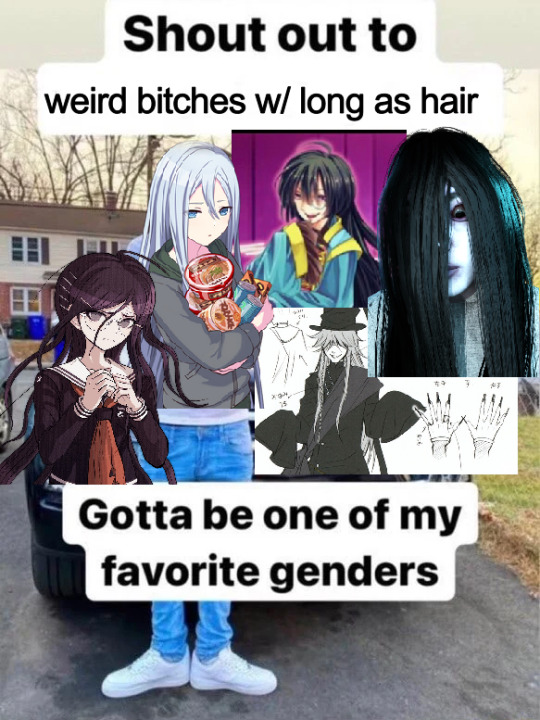
i made a meme :)
#meme#toko fukawa#kanade yoisaki#project sekai#Ma#evillious chronicles#voclaoid#black butler#undertaker#sadako yamamura#the ring movie#lgbtq#gender envy#sorry for so many tags#kms i just noticed the typo#the autistic urge to be a freaky little shadow creature
84 notes
·
View notes
Text
Guys! Yesterday I had a book-shaped piece of mail, and inside of it was my copy of Children and Childhoods in L.M. Montgomery: Continuing Conversations being returned, from another very dear user here! I bring this up only because some-months-ago I promised to copy out a particular article from this book, for yet another user here, who was interested! Interested because it’s on the the subject of a Fan Favourite thing... fan fiction. And better still because some of our (basically famous) mutuals here are mentioned by name! If you’ve ever wondered if the Montgomery scholarship is reading your fan fiction... the answer is yes, they are! They totally are. More than that, they also have some thoughts to share… as well as recommendations of their faves too! This article even covers the F/F and M/M fan fiction presented by fans in LMM’s universe, and I’m personally super excited to be able to begin reading these works, as soon as I can find them all. I’ve done my best to link what I could immediately find, but some of the mentioned stories were unavailable... potentially due to changes in usernames? (That said... if anyone knows of the works indicated here, that I haven’t provided a link for, please do share!)
This article, by the way, was written recently... in 2020! It’s very current, and it covers a few stories that were still being actively updated during the pandemic. The focus of this article is less so on canon (or really just the Anne/Gilbert pairing), though, and seems to prefer demonstrating the versatility of mixing relationships (Anne and Emily, for one!) and the wider more general universe-building aspects (the entanglements of future generations/Anne’s grandchildren) that fans have been expounding on for nothing less than decades.
Okay, here we go! xx
Continuing Stories: L.M. Montgomery and Fanfiction in the Digital Era by Balaka Basu
Fanfiction – the recreational (re)writing of texts – is a literary genre of rapidly growing significance. Abigail Derecho in her brief history of fanfiction identifies it as “a genre that has a long history of appealing to women and minorities, minorities, individuals on the cultural margins who used archontic writing as a means to express not only their narrative creativity, but their criticisms of social and political inequities as well.”
Insightfully defined by Francesca Coppa and Mary Ellen Curtin as “speculative fiction about character,” fanfiction can be even more precisely understood as fantasies about the diegetic positioning of characters in the context of various settings, communities, relationships both textual and paratextual, and eventually all manner of cultural mythologies.
Kristina Busse and Karen Hellekson describe the production of fanfiction as “part collaboration and part response to not only the source text, but also the cultural context within and outside the fannish community in which it is produced.”
They point out that the shift in the method of dissemination of fanfiction from newsletters and zines to internet archives means that “ever-younger fans who previously would not have had access to the fannish culture except through their parents can now enter the fan space effortlessly; financial resources have become less of a concern because access to a computer is the only prerequisite; and national boundaries and time zones have ceased to limit fannish interaction.”
The nature of fanfiction allows participants to cross-generational and socio-economic boundaries in an ongoing exchange of responses to a source text with which they share a fascination, developing new texts that in turn elicit their own responses. While the creation of fanfiction is evidence of an affective, loving, communal relationship with the source text, this genre of writing is still dismissed in many quarters as overly emotional, purely erotic, and even perverse, a type of amateur and immature engagement with popular texts that produces writing necessarily divorced from literary significance. Produced in staggeringly vast quantities by subcultures with complex vocabularies and traditions that can intimidate the casual reader, fanfiction is perceived by many to be more of a cultural practice than a literary genre, variously denigrated for its pornographic potential and its lack of originality. However, close examination reveals that fan writers are able to create a critical dialogue with the originating author in acts of communal storytelling that incorporate allusions and reference points to which other dedicated fan readers and writers may respond.
In this chapter, after examining how L.M. Montgomery and her writer heroine Emily themselves engage in practices now associated with fanfiction, I survey four forms of fanfiction that remove Montgomery’s novels from her seemingly idyllic and timeless island settings, contextualizing her characters and plots within history and other genres: the sequel set during the Second World War, the modern AU (alternate universe), the gap-filler, and the slash fic, all of which allow the young readers who grow up with her novels to engage in dialogue with the stories they love, a type of literary conversation that Montgomery herself models within her texts. Emily’s reading, which is active rather than passive, resembles twenty-first-century fans’ ownership of the texts they love, provoking creative responses. For instance, after reading works by Lord Tennyson, Elizabeth Barrett Browning, and Matthew Arnold, Emily writes, “Teddy lent me 3 books of poetry. One of them was Tennyson and I have learned The Bugle Song off by heart so I will always have it. One was Mrs. Browning. She is lovely. I would like to meet her. I suppose I will when I die but that may be a long time away. The other was just one poem called Sohrab and Rustum. After I went to bed I cried over it. Aunt Elizabeth said ‘what are you sniffling about?’ I wasn’t sniffling – I was weeping sore … I couldn’t go to sleep until I had thought out a different end for it – a happy one.”
The reactions Emily catalogues are those of the fan; they are viscerally felt in the body and attempt to dissolve the boundary between author and reader, producer and consumer. She inscribes Tennyson within her heart in order to possess the poem she loves; she creates a relationship between Barrett Browning and herself; and, most significantly, she interjects her own desired happy ending into Arnold’s tragic narrative, a corrective desire that is at the core of many works of fanfiction. Emily’s diaries and her story reflect Montgomery’s own experiences from childhood to adulthood as reader, writer, and reader-turned-writer discussed in the introduction to this volume. Depicting Emily as a voracious reader and a life-writer like herself, Montgomery places the child Emily’s voice in conversation with that of the narrator through Emily’s letters to her dead father in Emily of New Moon and through her diary entries in Emily Climbs and Emily’s Quest, creating a form of joint authorship that is referenced explicitly in “Salad Days,” the second chapter of Emily Climbs: “book is not going to be wholly, or even mainly, made up of extracts from Emily’s diary; but, by way of linking up matters unimportant enough for a chapter in themselves, and yet necessary for a proper understanding of her personality and environment, I am going to include some more of them. Besides, when one has material ready to hand, why not use it?”
The narrator’s willingness to use the “material” that is “ready to hand” reflects Montgomery’s and Emily’s practices, and also validates other writers’ use of the material Montgomery places at their disposal. As with many fans, Emily’s reading frequently makes itself felt within her writing.
Like Montgomery, Emily learns her trade through mimicry, from her first poem in blank verse inspired by James Thomson’s Seasons to her unwitting imitation of Kipling that is pointed out by her teacher, Mr Carpenter, in his review of her work. Like Sara Stanley of The Story Girl, whose compelling and fascinating stories are rarely if ever original, Emily is a fan of the oral traditions of her community, incorporating and building upon them in her own writing, transforming and recreating, for instance, the story of “The Woman Who Spanked the King” in Emily Climbs.
The retelling and versioning that Emily practises signal her immense admiration for the source texts she adapts, just as the creation of fanfiction does for Montgomery’s readership and fans. The possibilities inherent in versioning and adaptation are illustrated in Emily’s Quest. When Montgomery depicts Emily undertaking the reworking of someone else’s narrative, she is adapting an episode from her own experience while working for The Echo in Halifax, which she records in her journal. Montgomery, like Emily, was asked to create an ending for a serialized story, “A Royal Betrothal,” after compositors had misplaced the original text.
Like Emily, she claims that her “knowledge of royal love affairs [was] limited,” and that she was unaccustomed “to write with flippant levity of kings and queens.” Nevertheless, Montgomery manages to create a conclusion that passes muster, since “as yet nobody has guessed where the ‘seam’ comes in.” She is, however, curious about the original author’s reaction to her unauthorized adaptation, and while she never discovers this in real life, she does imagine it in her fiction when she introduces Mark Greaves, who is horrified by Emily’s new ending for the story but enchanted by its author. Neither Montgomery nor Emily engages in this sort of writing from a place of fandom; they have no previous attachment to “A Royal Betrothal,” and both are writing professionally. Nevertheless, the ability to solve the puzzle of the story and the weaving of their work into an already extant text are the very project of fanfiction: ludic narrative composition that recalls the way children play make-believe with the narratives they love, reworking and extending them. It is telling that Montgomery uses the metaphor of the “seam” to describe this particular craft. Jane Dawkins, writing about her fanfiction, which is inspired by Jane Austen, describes her fan novel Letters from Pemberley as “an old-fashioned patchwork quilt, where in place of the scraps of fabric reminding one of the favorite frocks or shirts whence they came, there is a line or a phrase or a sentence from one of [the original] books or letters stitched alongside the lesser scraps of my own manufacture.”
Montgomery’s final book, framed by the two world wars, is just such a patchwork sequel, albeit providing only brief glimpses of the characters that readers met as children and who have now grown older. When a version of the book was published in 1974 as The Road to Yesterday, these glimpses, lacking the interstitial materials, became even briefer, mirroring the more forced insertion of beloved characters that the two earlier collections, Chronicles of Avonlea and Further Chronicles of Avonlea, display. Only two of Anne’s grandchildren – Gilbert Ford and Walter Blythe – are obliquely referred to, in the story “A Commonplace Woman,” where an unpleasant young doctor reflects on both of them as potential rivals for the affection of a beautiful girl he himself hopes to pursue.
However, the full novel, The Blythes Are Quoted, published in 2009 and comprised of short stories about the people in Glen St Mary and over the harbour, is interspersed with poetry by both a young Walter and an adult Anne. The poems are cut with tiny slices of dialogue that suggest the continuing lives of fans’ favourite characters and how they might have developed. In “‘Dragged at Anne’s Chariot Wheels’: L.M. Montgomery and the Sequels to Anne of Green Gables,” Carole Gerson notes the mixture of feelings from pleasure to frustration that Montgomery records in her journals as she prepares to write her first sequel.
While Montgomery wrote the first installments of her various series out of inspiration, she was certainly aware of what her market desired from subsequent installments. She often regretted the necessity of marrying off her characters, but was aware that her fans demanded this conventional outcome for the characters they had come to love; these traditionally romantic endings, when not offered by Montgomery herself at the instigation of her publishers, are regularly deployed by contemporary fanfiction authors building on the source texts.
Indeed, long before the original structure of The Blythes Are Quoted was revealed to readers in Benjamin Lefebvre’s afterword, fanfiction writers were spinning off lengthy narratives that included a third generation of young Blythes, Fords, and Merediths dealing with the onslaught of the Second World War. While earlier installments in the Anne series – such as Anne of Green Gables and Anne’s House of Dreams – depict the deaths of Matthew, Anne and Gilbert’s first daughter (Joyce), and Captain Jim, Walter’s death in Rilla of Ingleside is somehow more striking. Unlike Matthew and Captain Jim, he has not yet had time to grow old; unlike Joyce, readers have had opportunities to get to know him as a child in Rainbow Valley and as he grows into young adulthood in Rilla of Ingleside. His death is unnatural and, therefore, all the more horrifying. These two aspects of Rilla of Ingleside – the evocation of history by a nostalgic fictional world that is still tied to real time and the use of high drama, tragedy, and romance – provide fanfiction authors with a model they can use to appeal to the emotions of those readers who are immersed in the next generation of Montgomery characters.
The Second World War, then, provides an entry point into the series for fanfiction authors, who can deploy real history coupled with beloved characters to create a tale that feels absolutely authentic. One example of this is a short story, “The Pen and the Sword,” written in 2007 by MarnaNightingale. Here, mimicking the style of Dorothy L. Sayers’s The Wimsey Papers (a series of Spectator articles published between 1939 and 1940, which interestingly also continue the story of First World War–era characters during the Second World War), MarnaNightingale employs epistolary excerpts and newspaper articles to tell the story of a family going through the horrors of war for a second time. Grounding her fragmented story – like The Blythes Are Quoted, a mixture of genres – in the accounts of novelist Mollie Panter-Downes (1939) and war correspondents Ernie Pyle (1940) and Ross Munro of the Canadian Press (1941), whose articles are attributed to Kenneth Ford, she offers a story that, like Rilla of Ingleside, is anchored to the historical moment, while also nostalgically focusing on the character development that comes from Gilbert Ford’s death, Rilla’s and Faith’s reactions to the war, and the lives of their children. Here war also serves as an opportunity for new experiences, particularly for women and children: Rilla takes a factory job as a machinist, liking it better than working in Carter Flagg’s store; one of Anne’s grandchildren, Susan, plans to be a doctor; and Faith, who worked as a Voluntary Aid Detachment nurse in the First World War, mentions how she can sympathize. As well, the daily tidbits that flavour the pages of Rilla of Ingleside are there: one article, attributed to Anne, includes the recipe for Susan Baker’s war bread, reminding readers of the problems of wartime rationing, even in the Americas. Real life events – like the Canadian forces trying (and failing) to make a beachhead at Dieppe – arouse the passions of the reader. Unlike Austen – who also famously wrote of three or four families in a country town, but kept the Napoleonic wars firmly in the shadows – Montgomery brings the passions and high drama of the world stage into the sleepy villages of Prince Edward Island, which inspire fanfiction spinoffs.
The long novel Cecilia of Red Apple Farm, by a fan author who posts under the pseudonym ruby gillis, also directly reworks passages and scenes from the whole range of Anne books, set in the late-nineteenth century, to The Blythes Are Quoted, set in the early years of the Second World War, to highlight the similarity between her new generation of characters and their ancestors. Cecilia is the daughter of Una Meredith and Shirley Blythe (characters often married off in fanfiction). Like MarnaNightingale, ruby gillis provides period flavouring in the styles of dresses and behaviour and in references to 1940s popular films and songs. Simultaneously, this setting offers new opportunities to her female character: Cecilia wants to be a doctor, and rather than staying in Canada, she joins up to be a nurse in England. She has a series of romances – one with Sid Gardiner (before he marries May Binnie), and one with her cousin Blythe Meredith, who is this generation’s poet – before finally ending up with Marshall Douglas (the son of Mary Vance). Just as Anne initially refuses Gilbert Blythe in favour of Roy Gardner’s resemblance to her ideal man in Anne of the Island, ruby gillis’s Cecilia is fooled by the allure of Sid and Blythe as Roy Gardner–like romantic heroes into believing that she does not truly love her fun, practical, “Gilbert-esque” friend. Published in 2004, Cecilia of Red Apple Farm further illustrates the opportunities presented by reusing and reworking a body of texts through its incorporation of Montgomery’s poem “I Wish You” as the work of Blythe Meredith. Montgomery includes this poem and attributes it to Anne in The Blythes Are Quoted, although ruby gillis could not have known this when writing. The repetition of names and circumstances might seem derivative, but for readers who have read and reread the original books so many times, the extension of the story world is prized, even if – perhaps even because of – its callbacks to the original text. Due to the tendency of fans to fixate on “the good bits” in a reread, these parts can be taken for the whole.
Austen fanfiction demonstrates this aptly. Indeed, Helen Fielding’s second Bridget Jones novel, Bridget Jones and the Edge of Reason (1999), illustrates just such a reading of Pride and Prejudice: she shows Bridget, a fan, watching the scene from the 1995 mini-series in which Darcy, dripping in a wet see-through shirt, exits the lake, and then rewinding and rewatching the scene multiple times. How many times might a similar fan reread Walter’s letter from Courcelette? This repeated reviewing of selected portions can replace the amplitude of the original novel. With this delimited focus, narrative is no longer seen as a progression, but as a single moment of pleasure, sustained as long as possible. Reading the Second World War as a repetitive sequel to the First World War further highlights this possibility.
Even Montgomery seems to do so, as demonstrated in The Blythes Are Quoted, with its new generation of characters confusingly named after the old: Walter, Jem, Rilla, Di, Anne, and Gilbert. A variation on Marah Gubar’s kinship model, this kind of continuation highlights the blurred boundaries between child and adult characters who are literally related to one another and whose adventures mimic one another.
In a third example of fanfiction set during the Second World War, Weeping May Tarry, a long novel by ElouiseBates, Meggie, the heroine, is Shirley’s daughter (and also, surprisingly, Paul Irving’s granddaughter). In this story, which like Cecilia of Red Apple Farm is an installment of a longer series, Meggie is sent off to a conservatory of music to study singing, aptly combining the traditions of the nostalgic boarding-school novel with “Girl’s Own” wartime fiction. Following the tradition of Magic for Marigold, which explicitly suggests in its second chapter that the Murrays of Blair Water and the Lesleys of Cloud of Spruce exist in the same universe, @e-louise-bates (like many other fanfiction authors, including ruby gillis) suggests that all of Montgomery’s characters exist in a single universe: Meggie partners briefly with the grandson of Sara Stanley (The Story Girl and The Golden Road) and is close friends with Jane Stuart (Jane of Lantern Hill).
Going even further, @e-louise-bates introduces the grandchildren of the What Katy Did series as friends for Meggie and includes Betsy from Dorothy Canfield Fisher’s Understood Betsy as Bruce Meredith’s wife, creating a world where all the characters of early-twentieth-century girls’ fiction seem to have truly lived, where their descendants must cope with victory gardens and dances with soldiers at the Exhibition Grounds, and where kisses are much more commonplace than they once were.
These particular continuers of Montgomery are also desirous of membership in the community of her fans, seeing their literary endeavours as productive of approval from a fellow readership. Likewise, the novels are notable for their sociality – they seem to offer the reader not only a fantasy friendship with the characters themselves but also the very real society of fellow readers of the works. Thus, these fan authors attempt to diversify their stories so that they represent contemporary beliefs regarding multiculturalism; ruby gillis, for instance, introduces into the family by way of marriage a French girl who has had to flee the Nazis due to being Jewish, a situation Montgomery and her contemporaries might have had some difficulty accepting, considering early-twentieth-century attitudes toward interreligious marriage and Montgomery’s othering of the German-Jewish peddler who sells Anne green hair dye.
The Second World War thus offers writers of Montgomery fanfiction the loom on which to weave new, more diverse stories, even as The Blythes Are Quoted, which also traces the characters’ reactions to this new war, demonstrates how these readers-turned-writers followed Montgomery’s own trajectory, not knowing that they were doing so. On the subject of fanfiction, young-adult author Patricia C. Wrede writes: “The thing that fascinates me about fanfiction, though, is the way that it models the decision tree that writers go through (whether consciously or unconsciously) to get to their final product. For those of us who do this part mostly unconsciously, it can be interesting and instructing to see the multitude of alternate paths that a story could have taken, all laid out more-or-less neatly in different authors’ fanfics [… taking a slightly different fork in the road] resulting in the plot veering in a completely new direction. Friends become enemies; enemies become friends; goals and objectives and results shift and change.” Within these pieces of fanfiction, then, fan writers are able to follow these decision trees with subsequent generations of characters as well.
Another avenue of access occurs when fan authors transpose historical narratives into the contemporary moment. Perhaps the best-known example of this modern alternate universe [AU] conversion is the television program Sherlock, which takes Arthur Conan Doyle’s Victorian detective into the twenty-first century. While new cultural contexts appear, the essence of character is meant to be retained. Just as Sherlock uses text messages and blogs to substitute for telegraphs and handwritten journals, fans of Montgomery reimagine the relationships between her characters as if they were taking place online.
For instance, “Work in Progress” (2012) by verity postulates a friendship between Montgomery’s most famous heroines, Anne and Emily. In this piece of fanfiction, Emily circumvents Aunt Elizabeth’s injunction against fiction during her time at Shrewsbury High by becoming a blogger who is restricted to the “truth.” The story’s online summary, a part of which reads “Anne rolls her eyes. ‘Is your aunt really going to know if you cheat on your nonfiction with some hot prose on the side?’” shows how the story preserves the character qualities that Montgomery laid out, complete with references to the Murray pride and Anne’s orphanhood. Mr Carpenter’s admonitions are spelled out at the beginning of the story:
“Emily Byrd Starr has a sticky note on her desktop. It reads:
ITALICS
CAPITALS
!!!!!
“just”
“really”
CTRL+F!
It is almost like having Mr Carpenter in the room with her.”
Verity creates humour through the juxtaposition of contemporary social media and allusions to Montgomery’s source text. Another story by verity detailing Rilla’s romance with Ken Ford and her friendship with Una Meredith, “Rilla of Toronto,” takes place mainly through instant messages. In this story, Rilla reflects on her life from eighteen to twenty-five, tracing a continuum from her child self to her new adulthood, underscored by verity’s translation of Montgomery’s work into contemporary millennial language.
A third type of fanfiction narrative, the gap-filler, focuses on and expands the implications of the source texts. Moira Walley-Beckett’s Netflix/CBC series Anne with an “E,” as Laura Robinson shows in chapter 12 of this volume, is somewhat fanfictional in and of itself: as Robinson points out, the show fills gaps by bringing to the fore the darker currents that have always been beneath the seemingly untroubled waters of Anne of Green Gables, including Anne’s potential post-traumatic stress disorder from the disturbing life she led before coming to Green Gables. This kind of versioning and adaptation tacitly permits fan authors to feel that their versions are just as valid as those produced by professionals. Gap-fillers frequently expand on romantic pairings and in fandom are often referred to by portmanteaux of characters’ names that perpetuate some inside joke or work as puns. “Shirbert” – a moniker for Anne and Gilbert – is the latter, and demonstrates how fans posting on sites like Archive of Our Own (Ao3), Fanfiction.net, and Wattpad (this last generally populated by younger fans) develop their own language to identify their stories within the community for which they write.
One such story, “You caught me staring, but I caught you staring back,” by Anuka, clearly inspired more by the television series than the novels, begins with an author’s note that reads, “I decided to write some fluff for these two, because I need more Shirbert moments, and season 2 is so far away. I added gifs to make it more vivid.” Here, the romance between Anne and Gilbert as depicted by Montgomery and Walley-Beckett is not sufficient for the reader-turned-writer. Anuka wants the gaps in the narrative to be more fully explored than they are on either page or screen and to be made more “vivid” by the inclusion of images that help make the story come alive.
Similarly, “Rilla Blythe’s Wedding: A Not Entirely Comprehensive Account” by Scylla also fills a gap: Rilla and Ken’s wedding day, a scene that Montgomery leaves to the reader’s imagination at the end of Rilla of Ingleside. Modelled upon other accounts of weddings within Montgomery’s fiction, the story also suggests that accounts of Walter’s death have been gravely exaggerated, as he makes a stunning appearance at his sister’s wedding. In order to align her work with Montgomery’s novel, Scylla ensures that Little Dog Monday’s awareness of Walter’s death remains, but makes it only a technicality, writing, “His heart had stopped for a full ten seconds – long enough for his Captain to feel for his empty pulse and for Dog Monday to be jolted with the fullness of his death. Little dogs, after all, can only have tender dogs’ hearts. Grief to Dog Monday was an all-consuming thing, and when Walter’s heart began to beat once more, he was deaf to its spark of joy.” After meeting with his eldest sister, Joyce, in heaven – which is, as he had always hoped, Rainbow Valley, Walter is returned to life so that he may write of peace as well as war (as he did when he was a boy), marry Una, and repair the broken hearts of readers who did not want to lose him.
While heterosexual pairings are the most prevalent in Montgomery fandom, there is room for queer imaginings as well.
This very popular genre of fanfiction, known as “slash,” is generally defined as stories that centre on samesex romances between characters, particularly between men. Montgomery slash fiction usually stars Walter Blythe.
One slash story, “but i don’t know who you are” by @freyafrida, imagines a bisexual Walter. Told in an enduringly popular sub-genre of fanfiction often referred to as Five Things Plus One (which involves a series of thematically linked but not necessarily chronological scenes), the story is summarized by @freyafrida as “Five people Walter thought he wanted, and one person he didn’t notice until it was too late.”
This last person is original to Montgomery’s text: Una, whose apparently unreturned attraction to Walter is woven through Rilla of Ingleside. The other five potential partners are all alluded to as Walter’s close friends, beginning in childhood with Alice Parker from Anne of Ingleside and Pat Brewster from The Blythes Are Quoted and then carrying on through adolescence and young adulthood with Faith Meredith, Ken Ford, and finally Paul Irving from Anne of Avonlea. While his feelings for Faith and Ken are clearly unrequited, Alice, Pat, and Paul all express their own desire for Walter. The inclusion of the famous poet and Walter’s “model” uncle, Paul Irving, in particular, particular, illustrates how traits of sensitivity and aesthetic appreciation that challenge traditional ideas about masculinity are frequently interpreted as queer by fan readers and writers.
In another slash fiction, cero_ate’s “The Moving Finger Writes, and Having Writ Moves On,” Walter discovers his homosexuality while fighting in Europe:
He wrote half truths and lies once more, when he wrote his Rilla that he could not form poems of the depths of the war. For who could write his sister of the phallic love he had found? He had found his reason in a tow-headed American boy. He meant so much more to Walter than mere friendship could explain. He wanted to write, as sweethearts write, of the tempest of joy in the darkest night. But how would they understand? How would they even try to understand he sought not the Dark Lady of Shakespeare but the youth, fair and Wilde? When he was presented with Una’s faithful heart, he spurned it. When his tow-headed darling presented his own, Walter took it, greedy for him. His grecian style love, the boy who’s [sic] eyes danced, even in the darkest of days. He would do anything to keep him safe. But he could not present him to his family, for their scorn or pity. War had broken him, but made him as well.
While male/male pairings are generally the most popular stories in fandoms, Montgomery’s novels, peopled as they are by communities of girls and women, require that readers who want to queer the text must explore what is called femslash (that is, slash fiction featuring two female characters).
Such relationships have been explored within the academic setting. For instance, Laura Robinson remarks in “Bosom Friends: Lesbian Desire and the Anne Books,” that the relationship between Anne and Diana uses “the language that readers associate with adult romantic love rather than girlhood affections,” even as it is expressed through the heterosexual paradigm of marriage.
One fanfiction author, ArcticLava21, makes it clear that such fan written stories are not speculation but instead address key issues of representation. The author’s note to ArcticLava21’s short Anne/Diana story, “Nature,” reads, “Hello everybody! Hope your [sic] having a wonderful day. Before anyone yells at me for ‘sexualizing platonic friendships’ please note that this is for all those queer kids who grew up pretending. Pretending that he ended up with him instead of her, or desperately wanted representation. Are we good? <3 Enjoy yourselves lovely people.” The intended audience of the story, “queer kids who grew up,” again establishes the transgenerational kinship between Montgomery’s child and adult fans.
All fan fiction, shared on the Internet, exist in dialogue not just with Montgomery’s fiction but with the author herself, and between the fans who read the novels as children and adolescents and the adults that these readers become.
Whether fan writers extend the narrative or fill gaps, transpose chronology or to queer the text, these pieces of fanfiction allow fans not only to insert themselves into the narrative, but also simultaneously to revivify the original novels, published a century ago. In performing interventions to the text, Montgomery’s young fans grow up to reply to the discussions that she began long ago in the pages of her journals and stories, ensuring that all three – author, reader, and text – are continually reborn into a conversation that will never end.
#any typos here are all mine 😑#apologies because i’m sure there’s so many… i’m just bleary-eyed from the screen time it took to type this guy up!#like#why didn’t i just get the kindle version#lucy maud montgomery#fan fiction#anne of green gables#emily of new moon#too many individually referenced characters to tag here really!
46 notes
·
View notes
Note
I love Latter Pillar so much you don’t understand i adore him have have some headcanons for him
Daisey literally pulls Howdy BY THE ANTENNA and makes him give Latter a hug. They like Latter, he’s sweet. But him being dramatic sometimes gets on their nerves
Daisey and Lizzy do partake in the Latter teasing, but they usually shut it down if it gets to mean (Latter protection squad say what)
Latter and Eddie besties real, Latter reads his poetry in the post office and Eddie just listens while doing his mailman duties
Honey’s mean to him, but secretly like his poetry. He thinks it’s so bad it’s funny
He runs a poetry club, he’s made a few friends from it too :3
Lizzy loves her brother, she really does, but she cannot stand to hear his bad poetry. She send him ads for poetry lessons and he gets sad about it
Also randomly put in but I love those little bee kids (I don’t know their names :,) ) they look so cute I love them
Latter has 6 arms me thinks, idk if that’s confirmed lmao
I’m mentally I’ll and that update destroyed me so I’m focusing on Howdy’s dramatic, flamboyant brother :3
The Howdy's nephews (the cater-bee children <3) are Howdo and Youdo! I can't remember if its one "o" or two tho haha
But yes Latter is just,,, he's so,, Soo ajdhjssj <3 I love him and his silly dramatics and bad poetry
Forcing siblings to hug is hilarious! I should know as a Certified Annoying Sibling Who Likes Hugs >:3 so good Daisey lol Howdy needs to hug his brother
Lighthearted teasing is fun, and I think if Latter was genuinely friends with whomever he'd go along with it, maybe do improve poetry to tease them back dramatically pff
Yeah you think Howdy would be upset that his brother is friends with the mailman? Bc Latter and Eddie besties Is real and in your home <3 They could write each other letters when it's not the holidays and Latter send Eddie his poetry for approval bc Eddie is too nice to say it's bad <3 (cough Latter getting a crush on Eddie? whaaaatt cough)
Howdy secretly enjoying things feels on brand lol. but him enjoying it for the wrong reason (so bad it's funny) is hilarious
Sorry but my oc CJ would be apart of Latter's poetry club <3 They're friends now Speaking of the poetry club, I imagine they do slam poetry and Latter is really bad but trying his best lol
Not the Poetry Lesson ads 😭 sobbs why she gotta do him dirty like that sjdbsjdhj lmao
#six arms!!#imagine the hugs man#howdy move over your brother has you out gunned (get it? did i joke right?)#sorry anyway#as a poetry enjoyer i adore Latter. as a Dramatic Character enjoyer i also adore Latter#i have so many words about him sigh <3#what a worm! <3#thank you for the ask bestie! it was very good timing#i had just gotten back from work and was Not Happy#but you have lifted my mood <3 <3 ✨#im going to eat dinner now lol#welcome home#latter pillar#welcome home ocs#not my ocs#i mention cj once but no tag for him lol#dizztalkstoomuch#neon child#howdy pillar#eddie dear#plz ignore typos im too hungry to fix anything lol
33 notes
·
View notes
Note
Saw your fetal Mobei jun post and was wondering how you think SQH would snap if smth happend to Mobei?

As an author, he can be quite creative with his revenge...
I see LBH as a bit of a self insert/power fantasy for SQH. They both share qualities; the biggest difference between them being confidence/power. SQH could be a lot bigger of a player, but he chooses to blend into the background where LBH is front and center. I think though the way they present themselves is wildly different, the way that they love is quite similar. They have almost childish approaches to love and devotion. It’s possessive, so I think if something happened to MBJ, SQH would be just as ruthless and vengeful as LBH, it would just manifest in different ways.
#art tag#ask box#svsss#im sure u meant feral but the typo is killing me#at least im assuming you meant feral#kjfshajh#everyone in SVSSS is very lucky that SQH is humble/goofy cause he legit could have so much power#but it feels like he doesnt even consider that- or doesn't want it.#PIDW is like a power fantasy in a lot of ways#SQH is LBH with the opposite of what a protagonists halo is#thats just my take on it so far!#they also both have a thing for aloof powerful men#SQH was writing PIDW and said 'im going to give my protagonist so many cool features' and instead just passed down all of his issues#but balanced it by giving him a rly big sword
1K notes
·
View notes
Note
Let me be the one to ask. How did you come up with this Queerplatonic Frans concept? What drew you into making this?
Aww thank you for asking such a delicious question, pal! Hope you're ready to listen to my 1 am rambles XD
Alright so, to be completely honest...I actually don't truly know how Romance works to execute it myself 😬

Haha yup, sadly, the concept of Romance and Romantic Attraction didn't naturally come to me my whole life and I had a hard time understanding them. (Skill issue, amiright?) So I learned about them through fiction. And even then, my understanding of Romance was a little bit different from what it's usually is (spoiler: it wasn't actually Romance, the word I needed was "Queerplatonic").
I've drawn ship arts before I started drawing Frans and let me tell you, almost all of them were 2 characters just standing next to each other, no hugs, no kisses. Maybe they'll look at each other with fondness. And I was like "hell yeah, I've achieved Romance 😌" pfft.
My 2020 Frans works were where my ship art skills got improved. But you can still see that they aren't explicitly romantic (like, the first time I drew a Frans forehead kiss was for a request). Whatever, I was drawing stuffs about my fav lil guys and I was happy... and yet a tiny part of me wasn't feeling it, like it felt...odd to call them romantic. All these shippy art and I still felt uncomfortable to draw something extremely Romantic. (...this kinda sounds similar to a comphet kind of situation, you get what I'm saying?)
2 years later, I learned about the term "queerplatonic" and just like that, everything made sense =o Now THAT'S the kind of relationship I've been thinking about all these years and it felt magical. Suddenly, with this new knowledge, drawing shippy art felt more comfortable for me, cozy even. Cuz now, the "romance" I'm making is like something a little special for me.
And then I thought "what if I...👀" I grabbed Frisk and Sans like figurines and used them to make my own little ideas of a queerplatonic relationship as they were the perfect materials to work with for me.
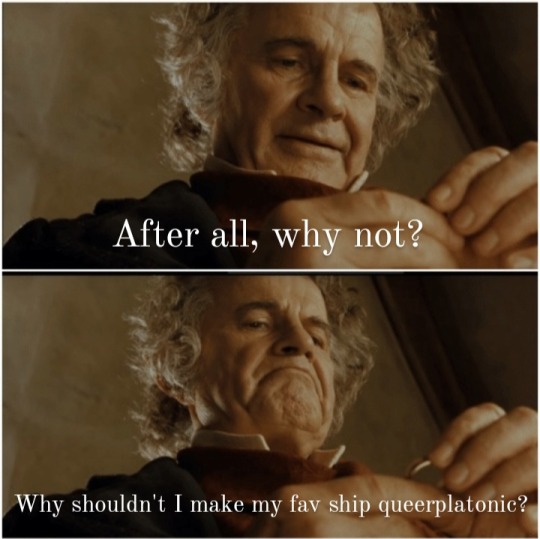
I've actually been busying myself with thinking up ideas for them a year before I revealed it to my mutuals, even long before I revealed it publicly 😅
Still, my Roommate Banter AU Frans is still classic romantic. I've only been making funny lil contents of them but I swear! They're secretly crushing on each other, there's romance underneath! I just suck at Romance 😭
So yeah, TL:DR, I don't completely understand romance so I did what I felt comfortable and did actually get the most, approach a ship with a queerplatonic lens.
Tho I'm still learning about Romance cuz there're other ships I'd love to draw shippy art for XD
Anyways, yeah thank you to anyone who read all of this and thank you dear anon for indulging me with your ask <3 Have a lovely day/night ^^
#asks#thank you for the ask!#frans#ah it felt so good to talk about this#even if it looks like i'm just talking into the void#but we all know that void is full of many wonderful things hehe#also i'm so tired and i should sleep but i couldn't so here i am#it's past 2 am by the time i'm done typing cuz i kept getting distracted#again thank you if you read all of this including the tags#imma pass out now#good nighttt#i hope there aren't typos and grammar mistakes above#aroace struggles amirite?#qpr frans
38 notes
·
View notes
Text
I keep seeing these tiktoks from people saying like "why campaign 3 of critical isn't doing as well as the first two" and it's entirely just their opinion stated as fact and it's soooo frustrating when there is an actual real answer which is campaign 2 aired during lockdown when we had more free time and 4 hours of people playing DND is a good distraction from the world falling apart. That's it! That's the reason! More free time = more time to watch ttrpgs.
#critical role#campaign 3#its frustrating b/c I also fell off cr3 and jave my gripes with it but those are juat my options!!!#juat b/c campaign 3 isnt made specifically for me makes is wrong#it's just not telling a story im interested in personally#oh my god there are so many typos in these tags I'm sorry its midnight im exhausted and typing on my phone#anyways i sleep now
27 notes
·
View notes
Text
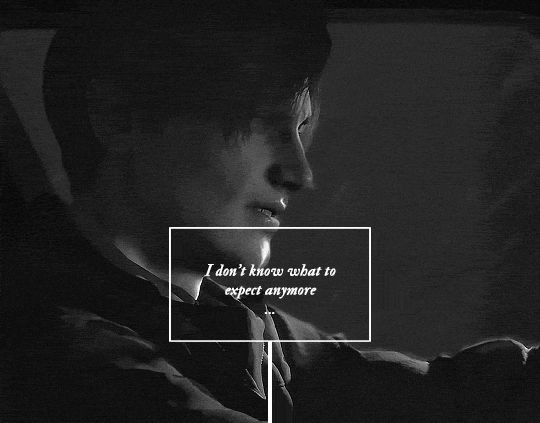
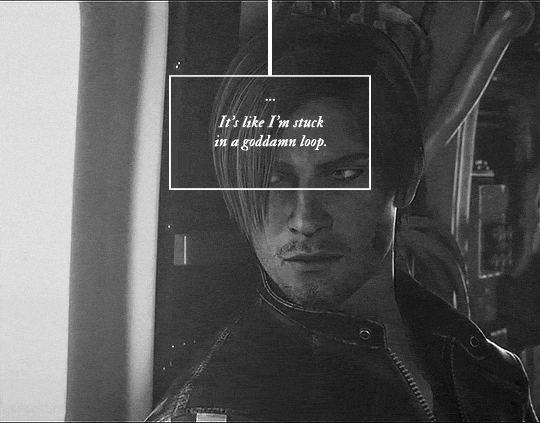
"I wish I'd come here sooner." -> "How much longer can we keep going on like this?"
Leon S. Kennedy
Resident Evil 2 -> Resident Evil: Vendetta
#i enjoy pain :)#resident evil 2#resident evil vendetta#resident evil#residenteviledit#leon kennedy#leon s kennedy#re#leon#soph.stuff#gamingedit#re:2#re: vendetta#how did i make SO many typos in these tags the first time around
362 notes
·
View notes
Note
I was wondering, do you think alfred and uhtred had feelings for each other in canon?
ALRIGHT SO. I'm so extremely sorry for taking so long to answer, life has been messy for a while now and I think it has been almost 3 months since you sent this. I have basically written this entire answer little by little every single day since I first received the ask and I have only just now finished reading it again.
EVEN MORE APOLOGIES BECAUSE IT TURNED OUT TO BE EXTREMELY LONG, I'll keep it under the cut!!
Please bear in mind that there are spoilers for the entire show and film and please forgive any possible typo.
OFF WE GO NOW!!
In general I think it is important to note that the last kingdom is a show FULL of queer characters (and I will die on that hill), mostly because there's just so much subtext in the whole show, and Alfred is 100% queercoded.
There are so many aspects of his character that just betray his queerness and the first thing that does that is literally the thing so many blame him for: the way he treats Uhtred.
NOW.
Let's look at Alfred's first scene ever. Alfred appears in 1x02 and he's introduced as someone who considers himself a sinner because of his inability to control his lust. When Beocca speaks to him about the girl he’s currently feeling guilty about, Alfred's immediate first reaction is to banish her, but instead he's presented with the option of bringing her into his service. Now the reason why it is proposed by Beocca is to keep her close to show God that he's able to resist temptation and, when he does resist, to thank this higher being he so desperately believes in. This is something that comes again in 1x03 when Beocca tells him to pray for strenght the moment he almost fails again.
In brief we know that there are two moments when Alfred has to pray: when he resists temptation and when he's tempted.
After he becomes king he reserves a very particular treatment for this girl who tempted him. In 1×04 we can see, for example, that soon after washing his hands, he basically throws a towel at her without a single glance. The treatment he gives her is a cold and distant one and that's the exact same way he treats Uhtred.
Indeed, as he did when he accepted Beocca's suggestion about the servant girl, I actually believe that proving God that he could resist temptation is one of the two reasons why Alfred has brought Uhtred into his service in the first place. The only other important use he had was his knowledge of the Danes, because, at least at this point of the story, the reason of him being such a fantastic sword genuinely does not stand.
In S1 it is very obvious that Uhtred isn't that much of a great warrior, and that makes sense because he's still very young, and at the end of the day he only first made his reputation when he killed Ubba, which, by Uhtred's own admission in the books, was entirely by luck, since he was actually the one who was about to get killed. Of course it is absolutely clear why he would have never admitted such thing, he needed that reputation and that was the first significant chance he got, but the thing is that he had been in Alfred's service for a few years already when that happened.
Alfred gave lands and a title of ealdorman to someone who was a 18 years old who came from Northumbria, a some guy who had absolutely nothing and no reputation whatsover, and that he himself barely knew, even worse a man who looked like a dane and that was a pagan. If you ignore Uhtred's point of view, that's absolutely insane of someone who just became a king who didn't even have that much support from his nobles yet.
It was serving Alfred that granted Uhtred to become an actual warrior with reputation, before that he wasn't one, as Uhtred himself told Alfred in 1×02.
As I said, the only good reason for Alfred to take such a man into his service was to have danish knowledge in court, but even that could have been something quick, you know, learning the basics and then just keeping contact with him as a spy, exactly as he did with Haesten at the end of S2 and at the beginning of S3, but no. Alfred tried his very best to tie him down to Wessex and make sure that he would remain. Why is that? It is to prove that he was able to resist temptation and being in control of his own body.
Alfred was an extremely pious man as many say throughout the whole show and even in the film. He needed to prove himself to God so that he would have had favour from his part and back then there was also the whole concept of "a king who's not able to control his body is not able to control his kingdom". Resisting temptation with a man would have proven it even more than resisting temptation with a woman, especially because, compared to the other servants, Alfred genuinely arrives to a point where he's actually and sort of obviously in love with Uhtred, so it isn't any longer just a body thing but a mind/heart thing, so even worse because that would cause his judgement to be clouded, Alfred himself admits this in 2x06, where he also says that Uhtred is a temptation to him.
The word temptation is an interesting one because Alfred always uses it with a sexual connotation, we saw that in s1 especially, but I want to talk about the episode I just mentioned. Here Alfred talks about Uhtred to Aelswith and he says:
What if all this time, it has been the work of the Devil tempting me? Offering me this warrior, this seemingly loyal and brave man, who piece by small piece, is eating at my soul and clouding what I believe to be right and wrong.
Alfred here, as I said already, explicitly says that he considers Uhtred a temptation sent by the devil, which, with the knowledge of his specific use of that word, can only mean one thing. The fact itself that Aelswith then replies that "this is what the devil would do" is noteworthy because that is a topic once called to attention by Asser in 1x06 when talking about Iseult he tells Uhtred "I know the devil exists, hiding within beauty is a trick he will use often, I'm sure". Aelswith gives Alfred a solution to the problem by telling him to get rid of him, and that's what does, he banishes Uhtred. Alfred talked of Uhtred as a temptation and then he chose to banish him for a while, does it by any chance remind you of something? His first instict in 1x02 about the servant.
Another thing that is very important to point out is that, as I said before, Alfred is considered a pious christian, so we know that Alfred prays daily and a lot, he even uses prayers to establish a political connection most of the times, but that can't prove his piety because many did too. The only times Alfred proves his piety are those when he prays alone and that happens 3 times in 3 seasons, which is funny since we could have expected way more for his reputation, but since it happens so little there has to be a meaning. As we said, we know that Alfred has to pray in two specific moments: when he has to thank God for resisting temptation and when he's tempted.
So very casually the times where he prays alone are always connected to Uhtred.
The first moment it happens is in 2x06, before the scene when Alfred admits that Uhtred tempts him and after the scene when Alfred screams at Uhtred "I do not know you and I could never know you", which is totally "know" as the biblical meaning of the word, if we consider everything that I have said before. The two other times are in s3, when Alfred's love for Uhtred is way more obvious and rather in a more romantic way than just attraction. The first time in that season is in 3x03 when he's there praying, with tears in his eyes, a few weeks (perhaps even a month) after Uhtred has betrayed him, and there he speaks of him and we see that he's hurt and wants to hurt Uhtred in return, so there's an element of heartbreak. The second time is in 3x06, after he has seen Uhtred again for the first time since his betrayal, and there we can find something close to worry for Uhtred's condition as a pagan, because he says that "He is a man in great need of the guidance of God". In 3x08 there's also an interesting hint about his prayers when Beocca hypothyses that Alfred prays for Uhtred's return and the truth behind it is written plainly on Alfred's face. His prayers shifted from a physical attraction type of temptation to something that could very clearly be recognised as love.
S3 is THE proof that Alfred was in love with Uhtred and, while you can already see it in the first episode of it when he watched Uhtred ride away from the city (which he also did in 1×02), that love becomes more obvious immediately after Uhtred betrays him in 3x02, YES THAT SCENE WHEN HE’S CRYING ALONE IN THE ROOM. While I do realise that it could be interpred as crying because his dream of an england was in danger, STILL you know that it is not just that, that man was heartbroken and the worst thing about it is that Alfred totally knew that he had no one to blame but himself, because Alfred is always perfectly aware of the way he treats Uhtred, think about the “I do not, I cannot” in 2x06 when Aelswith asks him if he trusts him, Alfred cannot trust Uhtred because if he did then he would totally fall into temptation, I MEAN LOOK AT WHAT HAPPENED TO AETHELSTAN WITH INGILMUNDR.
From that episode onward Alfred is on another level of misery, and that’s truly an achievement considering how miserable that man always is. First of all he’s angrier than ever and that anger reaches levels of revenge, confirmed by Alfred himself in 3×09 when he says this:
It was done to damn you. To inflict pain, possibly. I try to make decisions rationally. However, taking your children was not a rational decision. It was thoughtless. It was selfish.
Here Alfred admits that he wanted to hurt Uhtred and why did he do that? Because he wasn’t thinking rationally, and why wasn’t he thinking rationally? Because it concerned Uhtred. This literally always goes back to 2x06, because Alfred did say there that Uhtred clouded his judgment and that is the proof. When it comes to Uhtred, when Uhtred is around, he just can’t think rationally. That’s literally some romantic shit there.
I made the example of Aethelstan and Ingilmundr earlier and that truly fits this whole part really well, because in the film Aethelstan is portrayed as someone who’s blind and acting in a completely irrational way because he’s in love with Ingilmundr, his oathman. I would also love to point out how Aethelstan is portrayed as a pious christian king who prays and acts only for his own salvation, since he considers himself a sinner for his queerness. There’s so much guilt in that boy and, especially, more than once he’s compared to Alfred: first by Ingilmundr who tells him that he has to be pious so that men would speak of him as they spoke of his grandfather, and second when Aethelstan talks to Uhtred and indirectly compares his sins as worse than the ones of Alfred, so the connection between them is not only about piety, but also sins. Then, no less important, I think it is quiet obvious who Ingilmundr reminds of considering how he was “born a dane but raised saxon”. The parallels are right there and have never been louder.
Another parallel that I want to point out is the connotation between homosexuality and England, that’s particularly connected to the film because in SKMD Aethelstan wants to unite it simply to redeem himself for having a male lover:
Ingilmundr: Perhaps return to your grandfather’s vision for England. Perhaps now there is an urgency to bring the pagans to light.
Aethelstan: Will that cleanse me? Us?
Ingilmundr: Well, surely the greater the lands, the greater the faith. Go beyond what Alfred dreamed of. Look to the islands God made, not the countries ordained by men, and bring all to Christianity. So when you are judged, you will be found in balance. And thus may accept both the sin… and the conquest against it.
Notice how even in this whole thing Alfred sort of remains the greatest sinner of them all, because Ingilmundr here says to bring to christianity the lands that God created and not the ones that men, Alfred, wanted to make, it almost feels as if he’s saying that his sin would only be accepted if he does what God offers him in lands and therefore if he doesn’t put himself above God by being the one who decides which parts to unite and which not. Here Alfred is truly portrayed as someone who has put himself above God in his decisions and thus England would have never cleansed him for his sins, because he was directly sinning while planning it and actually, always back in 2x06, Alfred too considered himself a sinner for the way he was laying the fundations of the country, but not in the way Ingilimundr meant but because “I am reaching out for an England, all in the name of God, yet I am relying upon the strength of a heathen”, so what made him a sinner was his connection to Uhtred.
The thing is that as a consequence in the film England is connected to carnal sins and, indeed, as you have probably realised already when you watched the show, that country has ALWAYS been put in some sexual way, you may call it Alfred’s fav kink. That seriously begins in 1x03 when Alfred is making out with that servant (the same one we have talked about before) and he literally goes like “I will defend you with my life, you stand as everything that is precious, you are Wessex, England, always to be cherished, never to be violated, only to be loved, vigorously”, therefore Alfred arrived to the point of seeing someone as a personification of England and that happens only another time in the show and that is in 2x03 when he says to Uhtred “You are a Saxon who is also a Dane, The very embodiment of the England that must emerge”.
THE VERY EMBODIMENT.
To him Uhtred was the personification of England and now this might be a bittttt too much from me, but even in 3x09 when Alfred is dying his last conversation is about Uhtred and the role he will have in the formation of England, and there Aelswith is trying to make Alfred see that it is wrong because being guided (SO RELYING) by a pagan means straying from God’s rightenous path, but what does Alfred do? He literally defends Uhtred and those are his last few breaths, what has Alfred said to that servant? “I will defend you with my life, […] you are […] England”, and look at Alfred’s final words:
Aelswith: Why are the Danes forever at our door? Because we are being punished, Lord, for the presence of this heathen.
Alfred: He is for England.
Aelswith: He is an outlaw.
Alfred: My England... my love.
Alfred basically dies defending Uhtred and while “My England” could be interpreted as him thinking about the actual country, the whole conversation and the whole parallels both between 1x03 and 2x03, so with the knowledge that to him Uhtred is England, I DON’T KNOW I JUST CAN’T HELP BUT THINK “HMM YOU KNOW WHAT, PERHAPS HE WASN'T TALKING ABOUT ENGLAND ENGLAND”
As you have probably understood, I believe that the moment when Alfred confessed his feelings for Uhtred was in 2x06 and he literally confessed them to Aelswith, so at beginning of S3 she has been knowing it for years.
Now let’s see all of S3 from Aelswith’s point of view. In this season her beloved husband is dying and she's painfully aware he is, even more after Alfred confirms it in 3x02. She knows it will happen, thus she tries to stay at his side as much as possible because Aelswith loved Alfred so much and despite everything (cough cough despite his cheating cough cough), then at some point she witnesses her husband's life be put in danger when he is taken as a hostage by the same man she knows he has feelings for. That man escapes and her husband is abandoned by him and, instead of seeing the anger he's showing to everyone, she sees how broken he is because of that, because she knows that Uhtred did not only break his oath but wholeheartedly broke Alfred’s heart. She has to witness not only her husband’s suffering because of his illness, but also the pain he feels because that man he loves has left him. The nearer her husband gets to his death, the nearer she notices the way he wants to forgive that same man who has made him suffer for years now (s3 starts in 891/892 and Alfred’s death happens in 899), then right before her husband’s passing she finds them together in his study, completely alone. She tries to make her husband reason (indirectly even trying to remind him of how much pain he went through because of him) but instead her husband orders her to leave, she probably hasn’t even seen Uhtred return from the room until late in the evening. Her husband dies not long after and she’s hurt because she has lost the man she's stood by and loved for most of her life, but in all of this… Who’s the one who left her husband? Who’s the one who broke his heart? Who’s the one who in a way could have worsed his condition because of the mental pain he had to go through because of him? Uhtred. So she imprisons Uhtred, threatens to kill him, but then accepts to just exile him, but then, in front of the whole of Winchester, Uhtred gives an entire speech about his relationship with her husband arriving to a point in which he even says that he loved Alfred. This is worsened by the fact that, in her last conversation with him, Alfred was going against her just to defend him.
Aelswith’s anger towards Uhtred is the most understandable reaction ever.
A very interesting scene to me, with the knowledge that Aelswith has this insight of Alfred’s feelings for Uhtred, is the scene where she prays in 3x08, because... THE THINGS SHE SAYS!!
Lord God, give me strength and guidance to do your work. If it is right and proper to rely upon a heathen, albeit for violence, then I beg you... show me a sign. Help me. I want my son to remain untarnished by heathen ways. I wish him to be God's king. Pure.
Here she’s praying for Edward in the prospect of a possible connection to Uhtred in case the latter becomes his oathman once he’s king, but it is the last part of the whole prayer that is fascinating, because in this moment she says what a king is if he’s connected to him and, therefore, the reference to Alfred is undeniable: the king had to be “untarnished by heathen ways” so that he could be “God’s king” and “pure”.
Alfred was connected to Uhtred so he was tarnished by heathen ways, he was not God’s king and he was not pure, all because of it.
Alfred eveasdropped this whole thing and when Aelswith noticed him, they both understood exactly what she was truly talking about and the expression on Alfred’s face was one of someone who actually believed those things about himself as well, and indeed you see that a lot in S3 when he shows more than once that he’s scared that he won’t end up in heaven. In 2x06 there's also another hint at that when he says “I am reaching out for an England, all in the name of God, yet I am relying upon the strength of a heathen, the iron of a pagan”, and when Aelswith tells him “You are God's king, lord" his answer is "Yet at my right hand is a pagan”.
Alfred has always been terrified at the possibility of not ending up in heaven because of what he had with Uhtred, but despite all of that he's always defended him and saved his life multiple times, just as Uhtred did with him.
Since Uhtred arrived in Wessex he has risked death more than once in every season, and Alfred has always tried to find a way to save his life:
1x03, Ubba offered Alfred a peace for silver and Uhtred’s head, Alfred refused and told him that he would have returned to the sword if he didn’t accept only to be paid.
1x05, Uhtred unleashed a sword in front of Alfred during prayers, while screaming at him in front of many people of Winchester. That’s a crime that is supposed to be punished with death, Alfred made him crawl instead.
1x06/1x07, Uhtred, claiming to do Alfred’s business, plundered Cornwall and sided with a Dane against a christian king, Alfred was supposed to kill him immediately, even more when Uhtred, supposed to beg for forgiveness, decided to scream in his face that he would never kneel neither to him nor to his God, but instead Alfred accepted Leofric’s proposal of a fight to the death so that “God would decide”, that means he left the possibility of Uhtred’s survival, even more because he chose the exact day for that fight to happen, which, casually, was on the day of a saint he liked a lot, and indeed the day after he called Uhtred and told him that he didn't like the thought of someone dying on that day. He tried to save him by offering him the option of giving everything back and resuming the debt (since it was with the plunder that he paid it), but Uhtred didn’t want to leave Iseult, so he refused.
2x03, he sent Ragnar to rescue Uhtred from slavery.
3x02, first, he was most likely going to forgive Uhtred for desecrating the cemetery; second, he should have senteced Uhtred to death for killing a monk in front of the whole witan and then escaping (thus worsening his actions), but instead he asked for an oath and spared his life; third, after he threatened his life Alfred did order for him to be killed, but as soon as he escaped he simply banished him from Wessex, he could have made someone follow him, but he didn’t.
3x05, Uhtred was an outlaw, while he was in Mercia Alfred could have still had him killed, since at the end of the day he was one of his enemies, but instead he used the excuse of him having Aethelflaed’s protection. Alfred could have killed him and no one would have said anything about it, but he did not.
3x08/3x09 Uhtred was still an outlaw here and Alfred claimed before that he would have killed him if stepped foot into Wessex, but he did not, instead he even assured his protection for when he knew he wouldn’t have been alive anymore to protect him.
Now, I feel like Alfred has a sort of codependency when it comes to Uhtred. That man constantly wants him next to him and he almost needs him to be there, the fact itself that in 2x05 Odda mentions that Alfred always says the same thing about Uhtred’s hall in Coccham “every time we visit”, hints at them being there quite ofter and there was only a 3 years time jump between the first and second half of S2, so Uhtred has had those lands for 3 years, probably even less, so… Exactly how many times have you visited this man in 3 years, Alfred? But, whether there's actually an element of codependency or not, there's certainly something that pulls them together, and indeed it is explicitly said that Uhtred and Alfred are “bonded" and that for that fact alone they can't kill each other even when they should.
In 3×09 Alfred points a sword to Uhtred's throat and asks him if he believes he could kill him, and to that Uhtred answers “we are bonded, you cannot kill me just as I cannot kill you”, and it’s really fascinating because there's a parallel between that scene and the scene in 5x07 when Uhtred and Brida are fighting and, when she tells him to kill her, he screams at her that they “are bound as one, killing you would be like killing a part of myself”, and Brida and Uhtred were romantically involved.
My point is that it is for this exact reason that Alfred was never able to look at Uhtred and excute him as he was supposed to do so many times, even the only time it very nearly happened (1x07) he left before he could see it, and whenever Uhtred was hit by Leofric during the fight, if you look specifically at Alfred, it almost seems as if he couldn't breathe, so you know there’s a kind of “without you I would be lost and I wouldn’t be myself anymore” for the both of them, and you can see that especially in the one who had to live further when the other actually died: Uhtred.
Uhtred very much always clings onto a few things and people, but the more he loses those he cares for the most, the more he loses himself. S3 is truly the start of Uhtred’s sort of radical change, indeed the man in SKMD is almost nothing like the man in S1, and what made it possible was that season.
In S3 Uhtred faces many losses: first he loses Gisela, so literally the love of his life (she was and I will die on that hill), second his brother Ragnar, then he loses Alfred, and not even a few days after his sister Thyra dies.
Gisela’s death has started Uhtred’s fall, and since he got cursed and was, very understandbly, in so much pain, everything escalated very quickly.
He killed Godwin to defend Gisela’s honour and he was obviously hurt by what he perceived as Alfred’s disinterest in defending Gisela, as he himself in 3x04 complains about in a very hurt way that Alfred “allowed her to be called a whore” (even though Alfred did try to make Godwin stop, but Uhtred simply couldn’t hear it because he was too enraged), therefore he betrays him and then subsequentially feels absolutely so guilty about it that he arrives to the point where Leofric, as the personification of his conscience, lets us know that he believed he deserved to died because of what he did to Alfred. As soon as the first occasion arises (Aethelflaed is in danger) he immediately leaves, which you can see was already on his mind as soon as Brida suggested him destroying Alfred, thus he abandons his brother. He then finds out that Ragnar died and he thinks it’s his fault because he left him (though there could have probably been little he could have done to prevent it even if he stayed there), then he suddenly meets Alfred again and he sees how much he's hated by him, or so Uhtred believes, so he falls in an even worse emotional state than before. After some time, Beocca asks him to meet Alfred and Uhtred himself wonders “what makes you think he would speak with me?”, which just shows how much he truly thought that Alfred despised him, but he goes to meet him anyway and he speaks to him. For the first time since they have met they are honest to each other and Alfred shows him actual trust and even love in a way, but then Alfred dies not even a week after (probably the day after they talked actually), so even if they were finally at peace with each other, Alfred still died and they had no way to enjoy that tranquility.
Now all of this took a very obvious emotional toll on Uhtred and I believe that Alfred is one of the biggest because he knew that he going to die, and yet, because of Skade's curse as Uhtred believed it to be, he wasted those final years they could have had together. That man meant a lot to Uhtred and in the books there's this quote that always gets me:
I stood beside Alfred’s coffin and thought how life slipped by, and how, for nearly all my life, Alfred had been there like a great landmark.
And that’s so terribly true because, compared to all the deaths before, it is important to notice that Alfred was the one who was there the most, more than Gisela and even more than Ragnar himself, since the latter left for Ireland right before Uhtred became Earl Ragnar’s son. Indeed when Alfred dies you can immediately see a change in demanor in Uhtred, which is striking because compared to many other deaths he went through, Uhtred remains silent in face of many things, for example during Alfred’s funeral he's imprisoned but doesn’t say a word, the only time he utters something is to tell Finan to do nothing. S1 Uhtred would have never reacted in such a way.
Still in prison, you can see that he goes near a very dangerous edge when he finds out that Thyra died, and that edge is finally overstepped in 4x03 with Beocca’s death, and it is from this death onwards that Uhtred is a completely different person. The process started with Gisela's death, culminated with Alfred’s and exploded with Beocca’s.
As I said Uhtred always clings to people and Uhtred has always been sort of in denial for Alfred’s death. He always dismissed the actual possibility of him dying, even when he himself noticed the signs, even when Alfred himself told him that he was about to and yet that man was still there like “Skade preys on men's fears, Lord”, says the man who at that time believed every single word she said. The thing is that I believe Uhtred remained in denial even after Alfred died, because yes he was with his God, but there was a part of Alfred that still lived: his dream.
From Alfred's death onwards, Uhtred works both directly and indirectly for the dream of an England, indeed he actually proves his loyalty to that man more after he died than when he was alive, and that has a lot to do with the fact that it was the last connection he had with him, as in a way it was also for Aelswith if you think about it, but also there was the aspect that, before dying, Alfred entrusted it in his hands and, since Uhtred spent the whole of S3 considering himself a traitor and blaming himself for it, if that man shows you one last trust, a trust you have yearned for your whole life, even more with the thing you know is most precious to him, what do you do? You are willing to do anything you can to make sure that that dream happens, to make sure that you can prove your loyalty, to show that you can keep one last oath to him and make it up for the one you broke.
That is painfully obvious in the film.
In the film Uhtred has made Northumbria an unified place, and it is actually the first time the whole of it is under one single king (even if Uhtred doesn’t call himself that), which was what Alfred has wanted all along, because he knew that the main problem would have been that particular kingdom, so with this action Uhtred has paved the way for the upcoming unification of England.
In 3x09 Alfred told him that his last act as king was to make sure that good men held power and that's one of the main things Uhtred was doing. Uhtred has known Alfred for 28 years of his life, he spent countless times with him, so he knew what Alfred would have wanted and every single decision he took in the film was so obviously made with the thought in mind of Alfred's wishes, and indeed Uhtred held the reins until he knew there was someone fitting to rule, a good man, just as his king would have wanted.
One of the most beautiful things to me is that Uhtred was lord of Bebbanburg at the time, so lord of the fortress he has waited his whole life to get back to, and yet he was mostly and more concerned about Alfred’s dream dying rather than the survival of that. Uhtred was also in a situation where he didn’t want to fight anymore, he didn’t even particularly believed he was still a warrior, and yet as soon as that dream was threatened, he didn’t hesitate once. That man was even forbidden to take part of the battle, since it would have been too dangerous for him, but he didn’t trust anyone else to protect Alfred’s dream and thus Uhtred went and died for it.
That man would have never died if he listened to Aethelstan's commands, but he defied them to not betray the little trust Alfred put in him right before he passed.
When he went back to Bebbanburg he didn’t even allow himself to die until he knew that there was an England out there and that Alfred’s lineage was on the throne of it, and during that scene he says that all he wanted was to be honoured in valhalla for “standing by an oath”, which yes can be interpreted as the oath of protecting Aethelstan, but remember that in S3, in Uhtred's mind, he did the most terrible thing of them all by breaking his oath to Alfred. Making England happen was the only way he could have forgiven himself for it, absolutely striking is the moment when the dream is fulfilled and you can how Uhtred is on the verge of tears and I think that has to do with two main reasons: first, he knew that with that Alfred would have finally known and understood how he could have never have betrayed him, and second, Alfred’s work was finished and there was nothing that kept him alive in his mind anymore.
Uhtred died soon after that so, in my mind, he totally met Alfred again at some point. In the show, for Thyra who was in a situation where she still believed in valhalla but was actually a christian, it was accepted the view of being in both places, therefore it is most likely the same for Uhtred, you know, a whole concept of peace rather than an actual place.
Dying for England is the most obvious declaration of love from Uhtred’s part, but if we want to point out actual words, Uhtred in 3x10 says that Alfred was “a man I loved and despised”, and he even calls him “my king”, which is something Uhtred will never do again for anyone. For the other kings he always just refers to them as “our”, therefore he speaks for his people and not for himself, but for Alfred? Oh, that’s a “my”.
For Alfred the thing was different because the man was a christian with so much guilt inside, it would have been way more difficult for him to say out loud that he loved Uhtred.
I do believe though that he did say it in subtext when he told him that “I should have closed my eyes and rattled at Heaven’s gate some time ago, it was the hope of this meeting that has kept me alive”, which is a lot, considering that the man was suffering like hell because of his illness, and yet he held onto life just for the purpose of seeing Uhtred one last time. It is also very interesting that on his deathbed he asked Uhtred “are you here or is it my sickness?”, because it hints at the possibility of Alfred having hallucinatione of Uhtred in the past when he was ill and WHY WOULD YOU EVER SEE SOME MAN WHEN YOU FEEL UNWELL? AND ESPECIALLY WHY ARE YOU NOT EVEN SURPRISED THAT YOUR MIND COULD HAVE CONJURED UHTRED COMING TO YOUR CHAMBERS IN THE MIDDLE OF THE NIGHT? There’s only one answer to that:
You are gay for that man and you are in love with him.
They both were.
So anon, the answer to your question is: Yes, I do believe that they had feelings for each other.
Thank you for coming to my ted talk!
#if anyone seriously read all of this know that you have my most devoted love#i first focused on alfred and then on uhtred#there's a double space when i switch to uhtred's part#so many other things would be interesting to point honestly#like for example the way from the books you know that uhtred doesn't want to be called king because of alfred#but it was too long already#hopefully some of this makes sense#thank you for asking and sorry once again for taking such a long time!!#the last kingdom#alfred x uhtred#tlk alfred#uhtred#seven kings must die#god even in the tags i have made a typo#forgot to add 'out' to point so it is supposed to be 'point out'#it's 2am okay#asks
29 notes
·
View notes
Text
Dragging your friend into a fandom with you so you can watch them suffer the same way you did is fun
#:)#hello fren#It'll be fine maybe probably#i can't wait to start sending you comics and fics once you have moee context#>:3#tmnt#rise of the tmnt movie#rise of the tmnt#rottmnt#rise of the teenage mutant ninja turtles#there are so many typos in those tags lmao
65 notes
·
View notes
Text
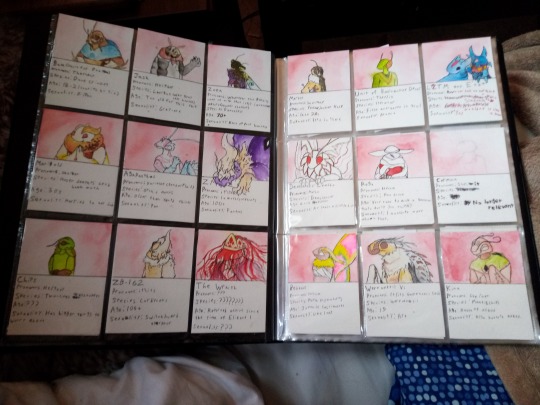
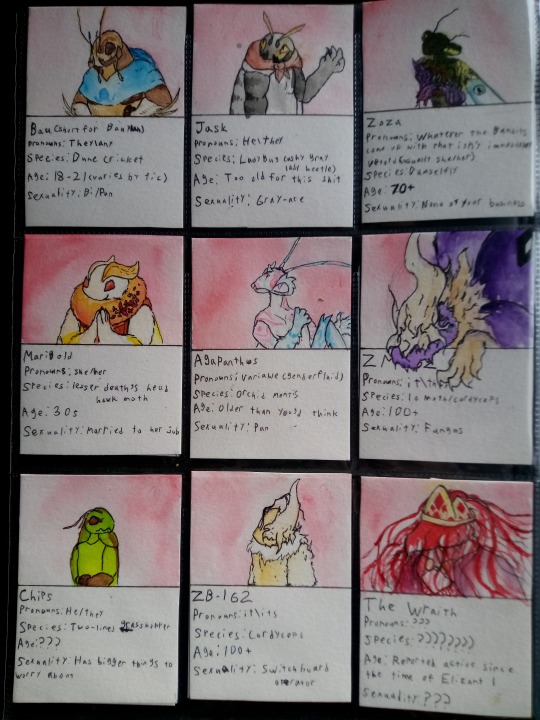
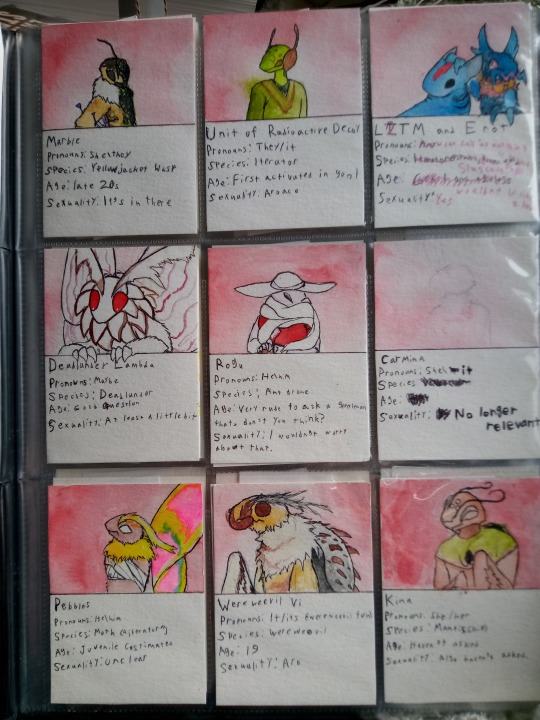
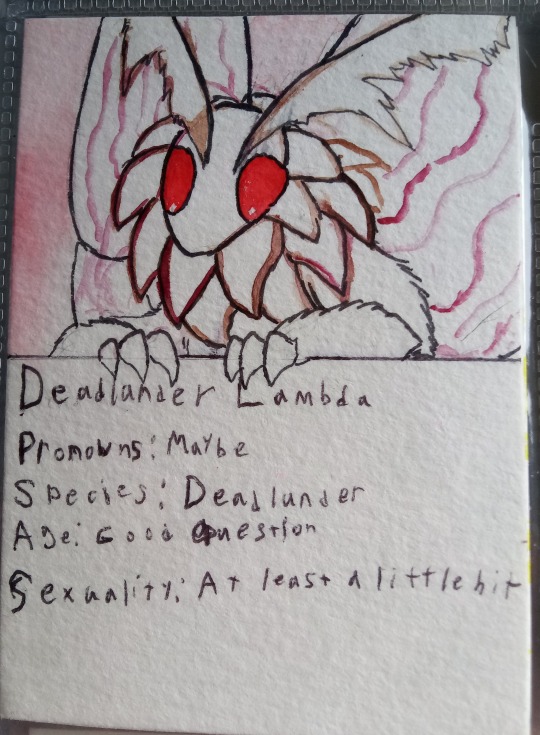

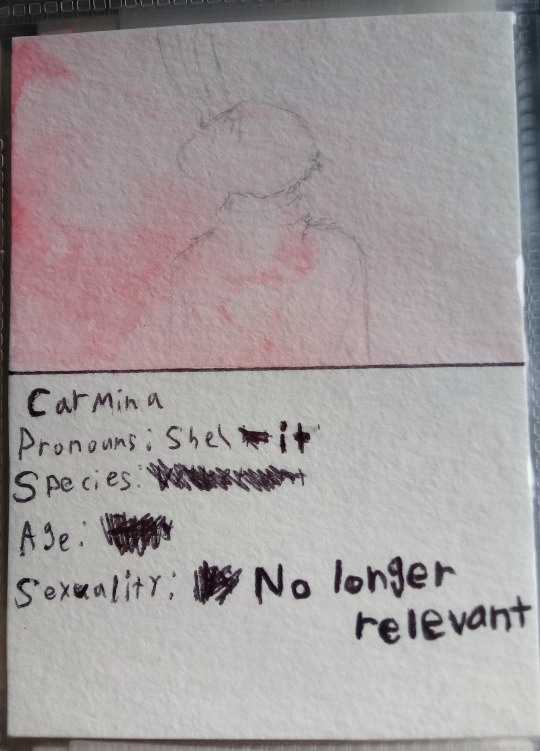


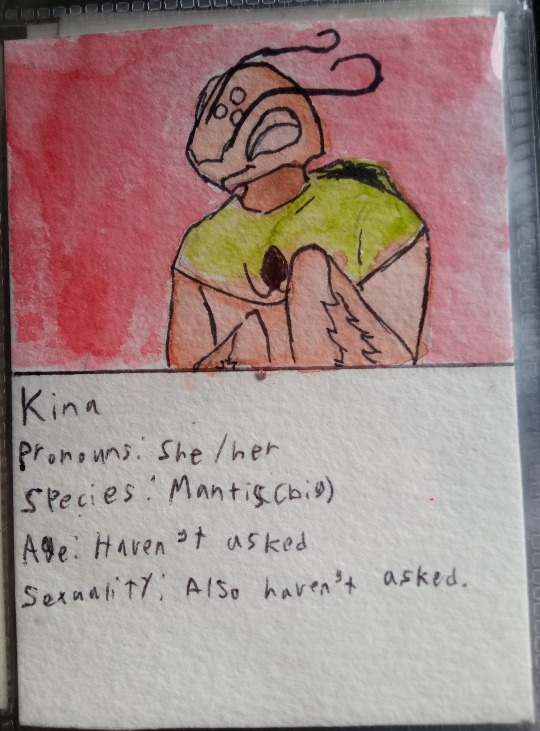
We have finally finished this project, and thus, The World's Worst Dating Sim is finally DONE! Just in time for April Fools Day. Now, with our six new contestants, choose, uhh... who's dateable? Or not dateable? This last batch was determined almost entirely by People Telling Us Who To Add, contains multiple AUs, and is... hmm. "Unconventional" may be a good term? Half of these are probably undateable but you can still shoot your shot.
As previously, it can be a platonic date if you want, you just can't be neutral. Deadlander Lambda belongs to @cordycepsbian and has been moved into our studio for duration of this poll. Profiles below the cut.
(we're linking the first poll here)
Deadlander Lambda - Maybe - Deadlander - Good question - At least a little bit
This, uhh...
...is this safe? We don't think this is safe. ..."Already had kids before"? What do you mean it's a parent?
...well, we can't get it out of the studio, so it's an option now? We guess? This... really doesn't seem like a good idea.
Rogu - He/him - Ant drone - Very rude to ask a gentleman that, don't you think? - I wouldn't worry about that.
A charming mystery from somewhere only described as "a faraway land", though he wasn't quite scheduled in this lineup, we think we can make an exception. This silver-tongued bug seems to be able to say just what's needed to get under your skin... and from the look of it, he's angling to take you somewhere private.
...come to think of it, haven't we seen that face before? On a poster, maybe? Well, it's not a surprise he's been modelling for things, he's certainly got a pretty enough face for it, but why do we feel... nervous, all of a sudden?
Carmina - She/(scribbled in)it - (illegible) - (illegible) - (illegible)(scribbled out with "No longer relevant" written in its place)
...where is she? She was meant to show up hours ago. What on earth could have held her up this long?
Pebbles - He/him - Moth ("iterator") - Juvenile (estimated) - Unclear
Right out of surgery, this one. While we're not sure if it's entirely responsible to include this one, and we certainly don't speak whatever language he's speaking... he's cute, isn't he? And looking for a home? Well, maybe if you're the sort of person who might want to rescue a domestic moth in a bad situation...
Wereweevil Vi - It/its (wereweevil form) - Wereweevil - 19 - Aro
Pre-existing hangups mean that you can only date this one in wereweevil form. Good luck.
Kina - She/her - Mantis (big) - Haven't asked - Also haven't asked
Well, we assume that you can do less lethal than the bandit who people mostly know thanks to her former job as a corpse disposal unit, but some people might be into that sort of thing, honestly. Are you, perchance, also a mantis?
#our art#bug fables#finished#watercolor#ocs#other peoples ocs#deadlander lambda#monsieur scarlet#carmina#five pebbles#wereweevil vi#kina#valentines#or we're tagging it as such for organization its actually an april fools poll#we treat the two events with about the same gravity so it fits#for clarification purposes: five pebbles is several centuries old and would be very offended at being called juvenile#however he is less than an inch tall and built like a stick and doesnt speak bugnish at all#so he spends most of his time lurking beneath furniture and trying to bite people with his new mouth. much to the hospitals distaste.#although the wereweevil is vi or at least an aspect of her it is not a terribly sapient one#it is hungry and afraid and desperate and lashing out in search of any pack#in search of ANY connection it can find#and the only way it knows how to do that is by violently mauling everyone and everything in its path so uhh good luck bucko#wereweevil vi in normal form has way too many hangups over intimacy to agree to an outing and must be approached like a feral cat#we know about the normal timeline and we added extra years so that she has the time to acquire more problems#thus ends our FAQ. good luck#EDIT: typo in the tags. ough
18 notes
·
View notes
Text
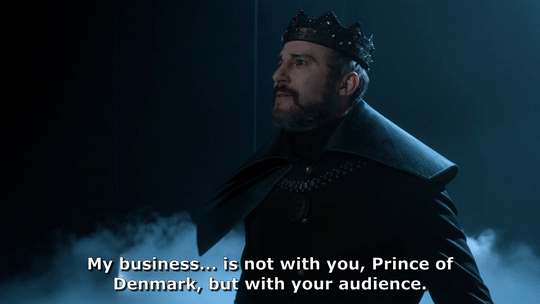
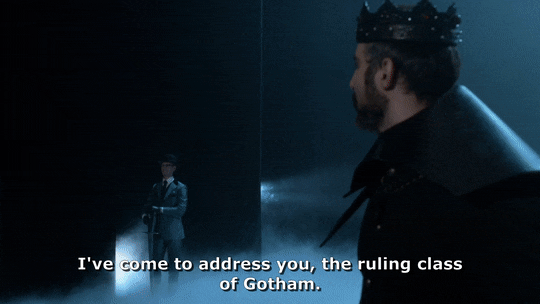
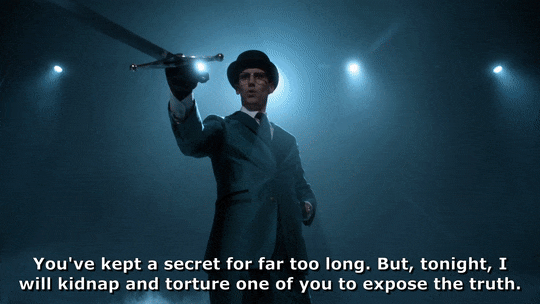
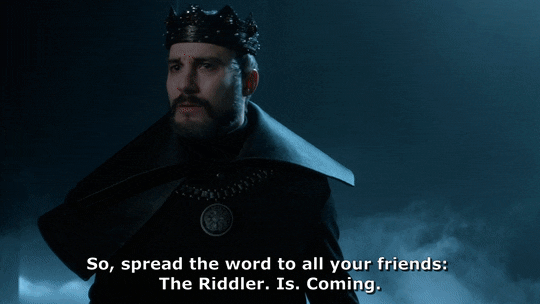


@giftober 2022 | day 23: full body
Gotham (2014) Season 3, Episode 17 "The Primal Riddle"
#stabbing cw#edward nygma#ed nygma#the riddler#riddler#gotham#gotham 2014#gotham tv#gif#gifset#bennys gifsets#really happy with how the colors came out on these ^__^#also if u saw me already make this post and then delete it thats bc i spotted a typo </3#idk why but this gifset in particular has been causing me so many problems ^^;#should all be good now tho >:3#hope anyone reading this has a lovely day/night ^w^#i mean-- i hope everyone has a nice day/night regardless of if they read this#tho i prolly dont need to specify that#if someone who didn't read these tags. read these tags and noticed the exclusion they'd be creating a paradox#oh well-- better safe than sorry <3#ANYWHO. fare well friend
104 notes
·
View notes
Note
tell about ur aus,,, go on
HELLO TY FOR THIS ASK
i have so fucking many aus so i'll ramble about a few
my latest one takes inspiration from this post and it's basically, dazai takes in atsushi and the akutagawa siblings, but realizing he can't really find a job to support all of them at once, he decides to go and (try to) reopen odasaku's favorite curry place. there are a few issues.
he is Not a great cook
atsushi can only make chazuke
aku and gin don't know how to cook
the place is kind of a mess
so eventually he goes and calls up chuuya and he's like "hey, you know how to cook, can you help me" problem is, chuuya's pissed at him bc THIS is when he calls him again and it's not an explanation of why he left, not a "sorry for blowing up ur car", not any of that, it's just another favor. so his immediate response is "fuck you, no" and dazai has to nag him into coming and helping, this being via taking some random pm member for hostage and specifically requesting that chuuya come pick him up
chuuya does indeed arrive, but he also breaks dazai's nose, so dazai ends up vaguely explaining with an ice pack on his face lmfao. this bit is what i have planned most vividly and is hopefully? gonna be a fic i publish. but also, later, ranpo ends up at the curry place and is like "damn you live like this"
and dazai replies just kinda, "either order or get out" but ranpo offers him a better job (that being working at the ada), and while he hesitantly agrees, it's only a part time thing for the first bit. also although i haven't decided yet i think he might also end up finding kyouka before the pm gets to her and tachihara before the hunting dogs find him bc i am weak to 1. found family 2. BIG found families.
chuuya is absolutely fucking baffled when he runs into dazai during an ada job, btw.
"i thought you ran a fucking curry shop"
"i do that too"
"?? what the fuck"
"it's called being a PART TIMER chibi"
"i'm gonna break your nose again"
anyway next au!!
cowboy au (btw, they still have abilities) where nathaniel is a travellng priest looking for a doctor to cure margaret who's deathly sick, and he hasn't really been having any luck (he's been searching for months to no avail), and eventually at this one town it's like.. it's late at night, nathaniel's thirsty, he heads to the bar to get some water. nikolai promptly swaps their drinks, nathaniel drinks something really strong and passes the fuck out, wakes up to being in an inn room (with noteably less money) and storms the hell out of the building just to find nikolai petting his horse and acting all innocent about doing anything. nathaniel just tries to leave, nikolai follows, and they travel like that for a bit (occasionally trying to kill each other) before they get the third member of their dysfunctional little party
do you remember that one kid fyodor killed?
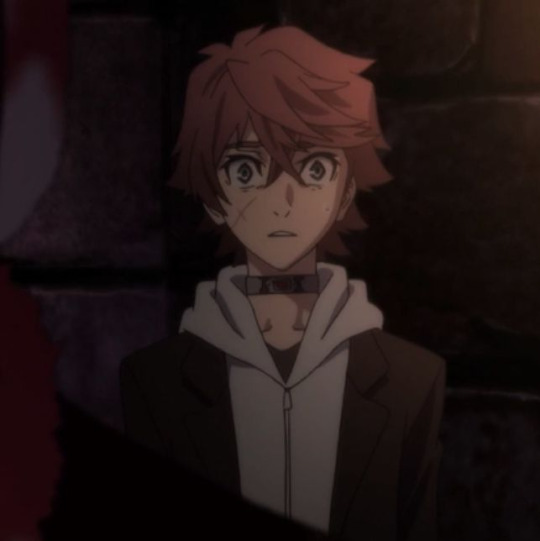
this little guy (karma), is a pickpocket who steals nathaniel's bible in the hopes of selling it to get food. the two find him, both kinda realize his situation and while nathaniel is about to point him in the direction of the town's local church nikolai goes "fuck that" and just straight up kidnaps him, and they keep traveling. nathaniel and nikolai are mutually, regrettably, falling for one another, but this just manifests as more murder attempts, to the point that one night, nathaniel tries to strangle nikolai, nikolai wakes up and strangles him back, and when nathaniel passes out he fucking dreams about nikolai and is HORRIFIED. things only get worse and gayer from there and i also think they go on a train at some point.
karma's enjoying the horse rides at least, and there's some other characters that show up though tbh idk who besides this one dazai scene and gin at one point
okay this other au is shorter, but basically: ada kajii. this is built off of SO many headcanons, but essentially kajii's backstory is just the lemon short story. except that kajii never found lemons, bc instead kunikida (his old friend/school friend that fell out of contact with him) reaches out, they become friends again, and so when kunikida joins the ada, so does kajii. kajii works as a clerk bc, like, he doesn't. know he has an ability. Oh Boy Does He Get A Surprise during dead apple
okay i was gonna talk about my eternal winter au but that would be an essay /lh
SO instead!! shiburan au, an au i never. properly named beyond that it's a shibusawa x ranpo focused au. also co owned with my bestie @feralshadowdemon <33
basically, yokohama is a smaller, calmer seaside town, no abilities or anything. shibusawa moves in, working at the pet shop across the street from this coffee shop that's connected to a bookstore. the coffee shop is run by (most of) the ada, and the bookstore is run by yokomizo; mushitaro and poe work there. the members of the ada who work at the coffee shop are fukuzawa (he owns it), ranpo, kunikida, and yosano. dazai is fukuzawa's newest adopted kid, and ran away from home. (he was living with mori (and elise) before) yosano Understands his situation, having done the same years before.
ranpo starts going over to the pet shop a lot, both bc he's running errands (fukuzawa owns three cats) and bc he likes talking to shibusawa. they eventually exchange phone numbers and start texting. in the background of this, btw, is soukoku: they had a messy breakup years ago, they act like they don't like each other, etc etc normal skk things. the flags are a biker gang who are alive and well here, and chuuya hangs out with them a lot. dazai is a bit jealous of them, ranpo knows this, and so when chuuya starts volunteering at the pet shop, ranpo brings dazai along on an errand run so the two run into each other again. they start talking again, slowly bonding again by virtue of wingmaning shiburan
also misc details
dazai and aku are just. they are just friends here :)
aku and tachi are friends!! also higugin is real
the akutagawa siblings live with hirotsu
fukuchi is the hunting dogs' dad; except for tetchou, who's jouno's boyfriend. he has stricter parents.
fukuchi here is a retired military veteran AND ex movie star. his movies are awful /aff
shibusawa has a pet cornsnake named draconia
odango is engaged here but oda travels a lot so they haven't got married yet
ango works in an office in the big city, but he visits dazai sometimes. they are friends
bramcraft is married, they adopted aya
kyouka and kenji also live with fukuzawa!! twincoded tbh
kyouka has narcolepsy
there is so much more but i have been writing this post for an hour SO just shoot me (another) ask if you're curious :D
and yeah that's some of my aus!! i have a masterpost of all of them slowly being built in my drafts hehe
#my bsd aus#my aus#bsd aus#bsd au#i have so many. ty for sending this ask i LOVE rambling ab my aus#i think i can tag this with ships. i do mention them idk#skk#soukoku#i hope i didnt make any typos#dino answers#bsd#gonna be honest a lot of the shiburan au was less throwing concepts around and more an r.p thread so it's hard to summarize sorry lol#bungo stray dogs#bungou stray dogs#nikonathan#shiburan#operationtimeguard
27 notes
·
View notes
Text
Finally

The beta hexsquad is complete
#no you dont understand how funny thus us yo me#you have luz willow and amity being all edgelords#with gus being the younger brother ™ that tagged along but everyone loves him#and hunter looking like a sickly childs ghost from the 1600s that died of like the flu or something#idk a lot about 1600s diseases ok?#anyway no one really knows how or why hes there but hes become a staple of the group bow and no one can get rid of him#the owl house#toh#toh season 2#beta au#beta luz#beta hunter#beta willow#beta amity#wow I just re read the tags and their are so many typos but im too tired to do anything about it
541 notes
·
View notes
Text

me gathering materials for my papier-mâché projects
#literally dug the half of them out of a trash can#my roommates kinda hate me#idc im hot. also its recycling.#i ran out of cardboard#so im wandering around my doem asking people if they have a bix to spare xie lian style#the previous tag has so many typos lmao#weeping boy
20 notes
·
View notes